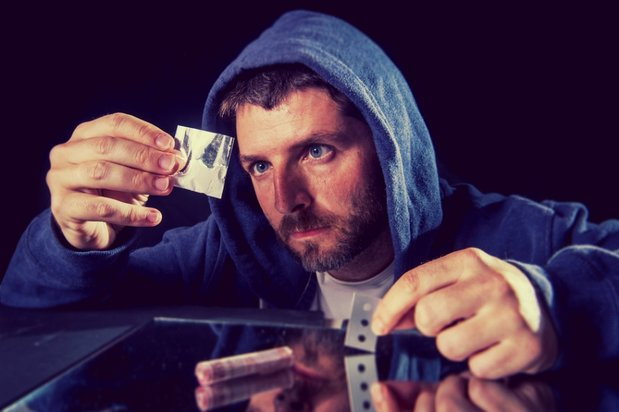Cocaine (Coke) is a stimulant that interferes with neurochemicals in the brain. It specifically blocks dopamine, serotonin and norepinephrine from being reabsorbed. The build-up of these neurochemicals in the nervous system causes the addict to experience the desired "high." In the U.S., about 14 percent of all adults have tried cocaine (roughly 37 million Americans have tried cocaine). The biggest number of cocaine users is men, ages 18 to 25.
Cocaine can be snorted, smoked or injected by the user. A person can easily become addicted to the illicit drug because they use it with increasing frequency in order to maintain the desired high.
Compared to other drugs, the "high" experienced from cocaine lasts only a short time, about 5 to 30 minutes, with some effects lingering for up to two hours.
Quitting Cocaine
Cocaine is the second most popular illicit drug, next to marijuana. It is a highly addictive drug, second only to methamphetamine in its addictive properties. It causes dramatic euphoria when it stimulates the pleasure centers in the brain, which quickly motivates the addict to repeated cocaine use and abuse.
With cocaine tolerance, which means needing more and more of the drug to achieve the same high, it becomes a very addictive drug relatively quickly.
Here are some steps to follow to help you quit cocaine:
- The first step to quitting cocaine is for the user to actually admit that you have a problem with addiction.
- Next, the addict must make the personal commitment to quit cocaine.
- Then you, the addict, must be willing to change all aspects of your life. Some important changes include the company you keep--not hanging out with other users and not going where they hang out. It is important to leave your drug-using connections behind. Altering your usual routines and finding a hobby to occupy your downtime can help affect the desired change.
- The most important step in quitting cocaine or any other illicit or addictive drug is simply not to take the next hit of the drug.
- Finding and being admitted to a detox facility with medical supervision allows you, the addict, to receive safe and proper medical care and, possibly, medications to ease the withdrawal symptoms. There are no specific, FDA-approved medications that work exclusively for cocaine withdrawal. Though it is not recommended, some cocaine addicts choose to detox at home without medical support.
- It is helpful to secure psychiatric counseling, whether undergoing inpatient detox or doing it on your own at home. Cognitive-behavioral therapy helps to change your long-standing behaviors, actions and reactions.
- Attending 12-Step program meetings on a regular basis offers strong support from peers who have experienced the same journey in life. There are Cocaine Anonymous (CA) or Narcotics Anonymous (NA) support groups to help recovering drug addicts with substance-specific issues. Attendance at these support groups is helpful and can keep you strong during recovery from your addiction.
- Another important step to kicking the cocaine habit is to keep busy. Idle time gets users into trouble. A new hobby, class or exercise program will provide something to occupy a recovering addict’s idle time.
Outcomes of Treatment for Cocaine Addiction
According to the Substance Abuse and Mental Health Administration (SAMHSA), about half of all drug-related visits to emergency rooms are due to cocaine. There is a high volume of relapse among cocaine addicts—about 55 percent. This is often due to inconsistent drug rehabilitation. The best long-term recovery outcomes are achieved by those who enter a residential program of 90 days or more.
Once you get through detox for cocaine addiction, it is important to continue with your rehab and maintain a strong support group in order to sustain recovery.
If you or someone you know is seeking help from addiction, please visit our directory of treatment centers or call 800-772-8219 to start the path to recovery today.








